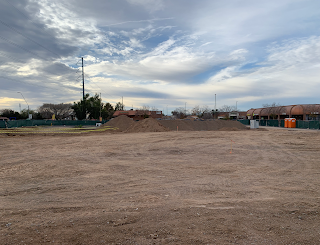Living in suburban Phoenix without a car
Phoenix is all about cars. The city is older than the invention of cars, but not much. It may have started growing with Street Cars, but most of its growth has been designed for automobiles. So if you plan to live in Phoenix, or suburban Phoenix, or anywhere except downtown Phoenix, you really gotta have a car. Not surprisingly, the traffic congestion is awful, and amount of collisions (I refuse to call them accidents - they're really inventibles), and Phoenix still leads the country in red-light running.
Walking along a sidewalk along any of the major streets in Phoenix is like walking along the edge of a freeway. It's horrible, and very dangerous. The streets have been widened, and widened, and widened, and the most of the entrances to parking lots (which cross the sidewalks) are designed like exit and entrance ramps on freeways. Crossing those points of the sidewalk on foot or on a bike is deadly. And I'm not criticizing the drivers here, drivers aren't expecting pedestrians or bikes there anymore than on a freeway exit.
Support Arizona history by becoming a patron on Patreon
Click here to become a Patron!
History Adventuring blog posts are shared there daily, also there's "then and now" photos, billboards, aerials, and super high-resolution photos of historic Phoenix, Arizona
Cars are so deeply entrenched into the mindset of people that I talk to, it seems impossible for them to even imagine not having a car. Their conversations revolve around the price of gas, traffic jams, road construction, or getting a great parking spot. I've heard people refer to the mile streets as being "a block apart", as if nothing in-between matters. For example, Peoria Avenue is a block from Cactus, which is a block from Thunderbird. Car scale is BIG!
I haven't really needed a car for years, so I sold mine recently. I do my work here at home on my computer, and the last "analog" job I had (where I needed to be there in person) was just a few blocks away at the local Community College. I've learned how to ride the bus, the Light Rail, and use Uber. I just got a cool recumbent trike so I can noodle around. I have my groceries delivered by Safeway, and other stuff I've been ordering on Amazon for years. I really don't like doing errands, so I haven't done them in years. I'll tag along with friends to the mall, or I can get there in about fifteen minutes using the bus that stops two blocks away from my house every half-hour. There's an app for that, by the way, that tells you exactly when the bus will arrive - they have GPS now. I can step out of my house, walk the two blocks, and time it just right so the bus is there in just a few minutes.
Getting out of my car has given me a much better view of what it would have been like when Phoenix was new. Yes, cars are wonderful, especially when it's hot (gotta love A/C!) but they really give you the feeling of being transported in an elevator. Even if you look out the windows, you're mostly just seeing taillights, and stoplights. Driving a car takes intense concentration, and you really can't look away, for even a few seconds. Once you're behind the wheel, you're working. When you get out of a car, so many other things are revealed. I've been noodling around the Sahuaro Ranch on my trike, which is between 59th and 63rd Avenues a half-mile north of Olive. It's pedestrian-friendly, and I've known people who say they've driven past it for years and had no idea it was there. My point exactly.
So you have to evaluate your situation. If you can't imagine life without a car, maybe you need to unleash your imagination. That's what this is all about.
Image at the top of this post: at the Automatic Transmission Exchange in the early 1970s, 4120 E. Washington, Phoenix, Arizona. Not having a car means never having to repair it, pay for repairs, or wait for repairs.




Comments
Post a Comment